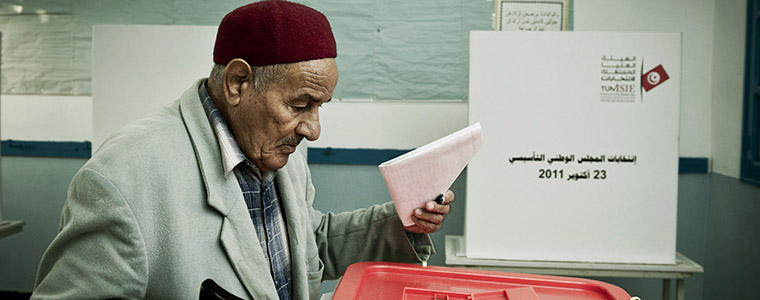Tunisia and Libya recently took diverging tracks in their political transitions. A USIP field mission to both countries to meet with political and civil society leaders reveals potential lessons from Tunisia’s advances and possible opportunities that still exist for Libya to salvage its transition.

Tunisia is, for now, the most successful example of a peaceful and decisive political transition. The deal struck by the country’s main political parties on a roadmap eased an acute political crisis and undeniably constitutes a major breakthrough.
Reaching agreement was not easy, but the discussions that led to it were supported by the weighty and direct involvement of the Tunisian Bar Association, the Tunisian General Labor Union (UGTT), the Tunisian Human Rights League (LTDH) and the Tunisian Union for Commerce, Industry and Handicrafts. This so-called “National Dialogue Quartet” put enormous pressure on political parties to end a months-long stalemate. By positioning itself as a mediator, the quartet used varying techniques of persuasion and coercion to make sure all political parties came back to the table.
This unprecedented example in the Middle East and North Africa materialized mainly because of the strong credibility these four organizations built over time since the era of Habib Bourguiba, who led Tunisia to independence in 1956 and served as its president for 30 years until 1987. Each of the four groups is seen as a mobilizing force within its respective constituency; that allowed them to alternately position themselves as mediators or as enforcers who could threaten to name-and-shame the spoilers in case of a failure to reach a political settlement.
Certainly, the 2013 military ouster of President Mohamed Morsi in Egypt and the subsequent violence in the largest Arab country contributed to the urgency of reaching a political agreement in Tunisia. Beyond the promising prospects for Tunisia, this experience should be documented to inspire other countries in political transition. The main aspects to study would be how the quartet formed, the internal mechanisms used by the four members to navigate the troubled waters of Tunisia’s transition, and the role of the various levels of dialogue and consensus-building within the Constituent Assembly.
Libya is on a very different track, one marred by increased violence and political stagnation. But several indicators suggest the country is at a crossroad and still has realistic chances to see a political settlement emerge. Direct and behind-the-scenes negotiations are still taking place despite flares of violence.
Not only was the National Dialogue Preparatory Commission, established by ousted Prime Minister Ali Zeidan, not dissolved, but it recently stepped up its activities. There are other smaller-scale dialogue initiatives underway as well, and the international community is vigorously trying to mediate to bring the scattered efforts under one umbrella. The major political players are serious about finding an acceptable deal because, as they have acknowledged, they know none of them could win outright.
The absence of credible civic groups who could play the role of “conflict inhibitors” such as in Tunisia is glaring in Libya. But alternative mediation mechanisms might still be found because at least the public seems to be interested in seeing their political leaders reach a settlement. While most Libyans rank security first on their list of priorities, most acknowledge that restoring security is not achievable without the right political framework.
The priority now should be to encourage the country’s embryonic, frustrated and disillusioned civil society to re-engage with the political process. Libya is in a critical phase of its political transition, yet a collapse into the torments of civil war is not yet a certainty. A lot can still be done to push for progress towards a less violent transition.
Elie Abouaoun is USIP’s director of Middle East Programs, based in Beirut.




